#me when slaughterhouse v changed my brain chemistry regarding how memory works
Text
Mikoto's amnesia, denial, and the order of events in MeMe
So my theory about the memories detailed in MeMe, as per Milgram's record of Mikoto being the "guilty one," is pretty simple. The events in the outerworld are completely jumbled, and I believe the bulk of them take place right after Mikoto's "first" murder if there were indeed multiple victims. This is gonna be a very basic look at the "flashback"/"real-life" sequences in MeMe. I feel like this may have been done before but I mostly just see analysis on the headspace/symbolism in the video and not the implications of the real-world bits, but this video has been discussed to death so I can't be the only one who's thought about it lol
In the first part of our timeline, we see lots of static and Mikoto swinging a bat at someone as the train goes by. I imagine the tracks were where the body itself was disposed of. Mikoto's "dream" shows faraway 3rd-person angle and it's almost as if he's watching "himself" commit the crime. However, the face of the victim, his own expression, and the injuries inflicted are obscured from his view the whole scene.
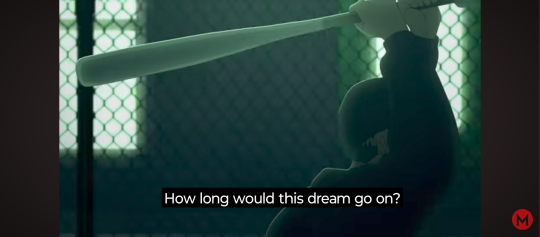
It abruptly cuts to him entering his house after this, which is where I believe Mikoto's memory starts to get patchier. The moments after a trauma are when the brain is still reeling from shock, after all. After his first dream sequence where he expresses confusion, I believe the second verse is filling in the gaps of what happened between finishing the crime and changing his clothes. You can't lie in Milgram though, and sharing a brain means sharing memories, no matter how deeply they are buried. The memory gets more detail as he is examined more, and it's already common for brains to remember things out of order. Mikoto is shown to be in-and-out of his headspace in MeMe; the memories of how "he" saved "him" (the other alter, likely a big part of who John would become) are not all his own, even if the choice to kill was.
I believe that chronologically, this is the next scene.
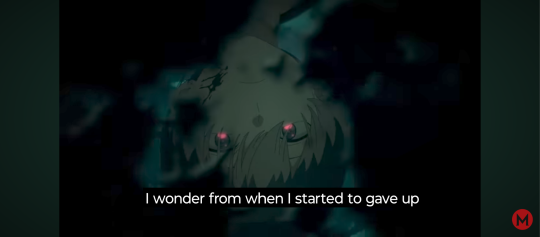
Presumably John, processing what they've done, recognizing himself as "not Mikoto" for the first time. Mikoto, then, is seeing "himself" from yet another angle, completely upside-down.
It abruptly cuts again, his jacket having been taken off. His face is once again obscured, like Mikoto remembers doing it but not as "himself."
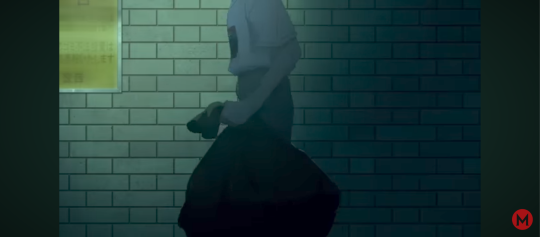
The angle here is more first-person, implying that Mikoto clearly remembers "dreaming" this part.
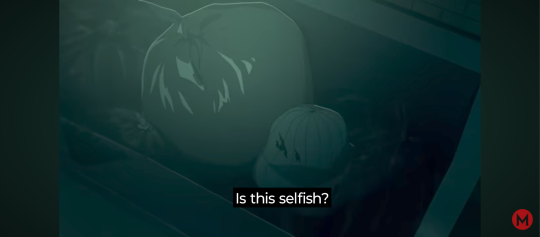
This is right before he goes home. He's disposed of the beanie, and presumably the jacket and bat.
Mikoto walking in his door immediately after the confrontation is likely exactly how he felt at the time. I believe this next line of dialogue is an alter, likely John or pre-John, speaking to him. "You don't have to keep it in and hide it away, 'I' will save 'me."" (Worth mentioning that "Boku" is used both times here.) It's the first time in the song he refers to himself as "you," which I feel like is pretty common for alters to do to each other even before they realize that they're completely separate ego states. This cut from the first verse, where it jumped right after the murder, shows him in the same pants and shirt he took the trash out in. This implies that Mikoto blacked out most of the way home, which tracks for an event as traumatic as killing a guy.

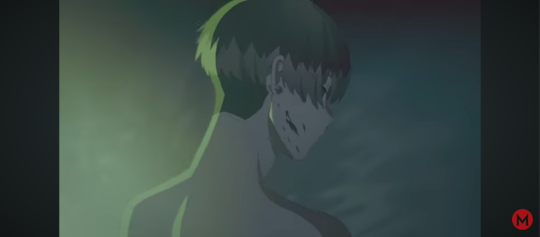
This part abruptly cuts to him on the couch, in new clothes and no longer covered in blood. As I said earlier, I believe Mikoto's memory begins to come back in bits and pieces as Milgram scans it, which is why the second part is where we actually see him getting cleaned up.
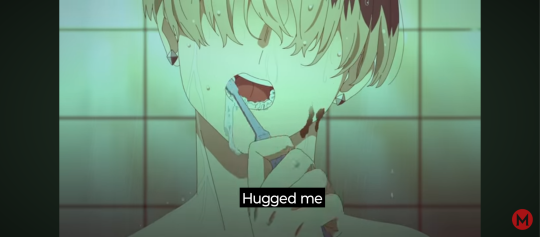
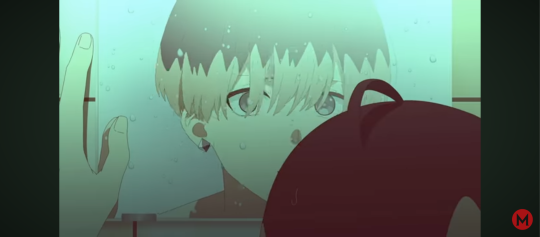
Just as he realizes he's fading in and out, and there seems to be someone on the other side who "doesn't care" that they've killed someone, he gets kicked back into headspace. Since he's in Milgram, that space could be defined as the present moment, while the memories themselves are reflecting more like flashbacks than a linear story.
That's why we see this next part so early, even though it happened after his clean-up work.
Here we see Mikoto's alter, either John or "Midokoto" (plausible 3rd alter show urself challenge impossible likely literally impossible look at that trauma-holding sonofabitch) banishing Mikoto to the shadow realm /j. No blood, new clothes, numb to the world and very clearly trying to forget. "That had to have been a dream" type shit.
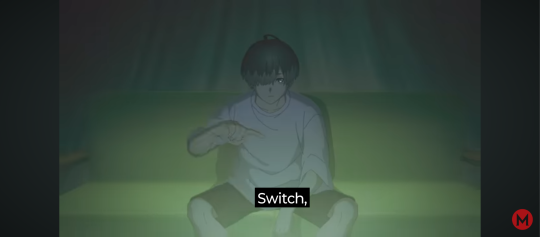
Ironically, alters who the host doesn't notice know when they're controlling the body better than the host, who takes it for granted like they're supposed to. If you don't know what DID is, it's easy to be aware that you are technically "working together" with yourself but not understand why it feels that way.
We're also shown this scene where he comes home from work, in the instrumental between Mikoto's Denial choruses. This is the answer to his question of "why?". He was running himself ragged and literally watching himself fall apart from the stress. Assuming he threw out that jacket, this could be interpreted as the days leading up to the murder.
Given that he doesn't have his beanie despite retaining the rest of the outfit, it could also be him continuing to go through the motions and act like the event didn't happen in the days after. I sure wouldn't throw out that shirt, it's a cool shirt. (Actually, it's such a cool shirt that I personally think it further proves the lack of pre-meditation, but like he still did it lol)
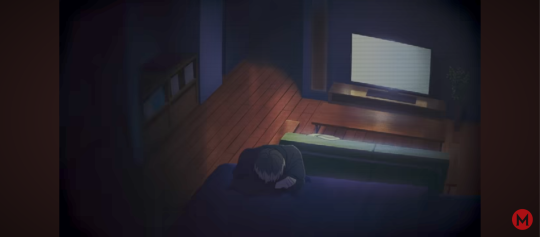
I think that in Mikoto's case, the farther away the camera is, the farther "our" Mikoto is from the front. It all happened so fast that his decisions were carried out for him, despite Milgram and his own sense of guilt determining that he himself was the one to take that path.
I don't think he's just talking to Es when he becomes more intense/angry about "why am I here?". I think he's speaking to his alter(s) as well. But I'm only allowed 10 images so I'll post about that later. The line "You don't have to keep it in and hide it away" from when he walks in his door contrasts directly with "Hurting it, holding it down, it doesn't change a thing does it?" Says a lot about how he dismissed his own stress and desire for change, unwittingly dismissing the pain of the people trying to help him.
He literally knows not what he does grrrrrr how dare this project be so fucking cool and good
#milgram#mikoto milgram#john milgram#mikotoposting#haha#again!!#meme milgram#milgram theory#possibly plate-of-corn type post#but like#the out-of-order memories about what could conceivably take up all of 1-5 hours of time#is so real#bitch got Unstuck in Time#me when slaughterhouse v changed my brain chemistry regarding how memory works
33 notes
·
View notes